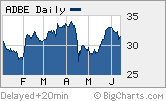 |
| An "Acrobatic" stock: Shares of Adobe have taken some twists and turns after announcing its deal for Macromedia. |
|
|
|
|
|
|
|
|
|
NEW YORK (CNN/Money) -
It would appear to be a software marriage made in heaven.
Adobe (Research), maker of the popular digital imaging software tool Photoshop and Acrobat, the standard program used for creating and reading portable document format files (PDFs), is acquiring Macromedia (Research), the developer of the Web animation software Flash.
The combined company should be a graphics software powerhouse.
But some investors have started to worry about the merits of the deal lately. They're also fretting over the possibility of some competition from a little software outfit called Microsoft (Research) in the not-so-distant future.
There was a double dose of what could be seen as bad news last Friday. First, there was a financial restatement from Macromedia that spooked investors. The company cut its reported earnings for fiscal years 2002, 2003 and 2004.
And second, Microsoft unveiled a beta version of a new graphics and illustration tool, codenamed Acrylic. That apparently scared some Adobe investors, as they feared Photoshop would soon have a new rival from a company with a reputation for crushing its challengers.
Shares of Adobe sunk more than 4 percent Friday and are now about 8 percent off their 52-week high. But several Wall Street analysts think the dip in Adobe's stock was an overreaction.
Macromedia concerns are overblown
For one, the Macromedia restatement was not a new development. So it shouldn't have taken investors by surprise.
"The restatements are more or less old news. Macromedia told the market back on May 3 that they were coming and they were in line with what we expected," said Steve Lidberg, an analyst with Pacific Crest Securities.
Macromedia said in May that it would need to account for liabilities tied to a paid sabbatical program for employees and on Friday the company added that the restatement would reduce earnings by 5 cents a share in 2004, a penny per share in 2003 and three cents a share in 2002.
Samuel Saunders, an analyst with Fulcrum Global Partners, said that the restatement would have no impact on Adobe's purchase of Macromedia because the changes wound up impacting operating expenses of just $9.2 million over the prior three years. He said that was immaterial considering that Macromedia generated more than $1 billion in sales during that period.
The focus on the restatement also takes away attention from the fact that the Macromedia purchase is a savvy one for Adobe. Lidberg points out that Macromedia's Flash version for cell phones, known as Flash Lite, has a lot of potential.
"The use of Flash on cell phones is definitely on the rise. I would expect that Macromedia would have a presence in the U.S. by early next year," said Lidberg, adding that Macromedia already has licensing agreements with cell phone makers, Nokia (Research) and Sony Ericsson.
And an expansion into the wireless world is key for Adobe. With more and more media content moving to wireless phones, the marriage of Flash with Photoshop and Acrobat makes for a formidable suite of graphics tools.
"Macromedia is all about rich media and Adobe is about the creative professional focused on document workflows and image workflows," said Steven Frankel, an analyst with Adams, Harkness & Hill. "You can imagine a scenario where Flash makes it easier to render a PDF document on a handset."
Microsoft has already tried, and failed, to beat Adobe
As for the Microsoft announcement...we've been here before.
Microsoft tried to supplant Acrobat a few years ago with a product called InfoPath. Saunders said InfoPath failed because Microsoft was charging too much for it and because it wasn't as good as Acrobat.
"There are two things we've noticed with Microsoft. They never get it right the first time and the culture is not supportive of creative professional environment," said Saunders.
For this reason, Frankel added that he sees no reason why Acrylic will be any more successful against Photoshop.
"The Microsoft news is noise. Photoshop is ingrained in the workflow of creative professionals. It will not easily be displaced by a first generation product," he said.
Finally, there's the issue of a near-term catalyst for Adobe's stock. The company will report its fiscal second-quarter results on Thursday.
Analysts expect the company to post earnings per share of 27 cents, up 23 percent from a year earlier. Sales are forecast to come in at $491.7 million, a 20 percent increase from the same period last year.
And these numbers could be too low. Adobe has a history of surpassing Wall Street's earnings targets. Saunders expects the company to beat estimates again, thanks to strong sales of its latest version of Acrobat.
With all that in mind, the stock looks attractive, trading at about 27 times fiscal 2006 earnings estimates. Earnings are expected to increase by about 15 percent a year, on average, for the next few years. So investors shouldn't be too concerned about Microsoft or a bombshell from Macromedia.
"Adobe should have a very strong quarter, another in a string of strong quarters," said Frankel. "The stock fell because somebody panicked about Microsoft. And the Macromedia deal makes good strategic sense."
For more about personal technology, click here.
For a look at more software stocks, click here.
Analysts quoted in this story do not own shares of the companies mentioned and their firms have no investment banking ties to the companies.
Sign up to receive the Tech Investor column by e-mail.
Plus, see more tech commentary and get the latest tech news.

|